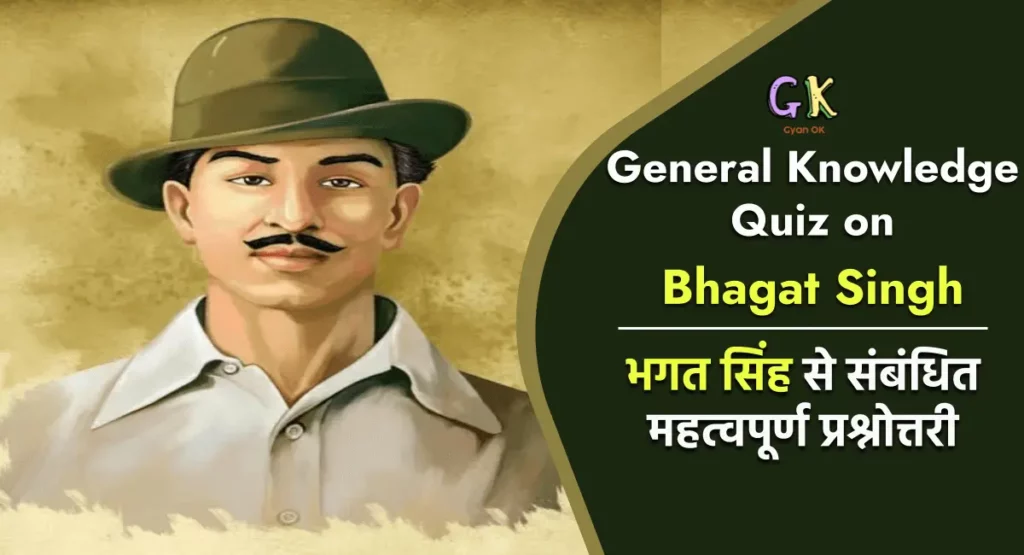Bhagat Singh, a prominent figure in India’s struggle for independence, was known for his fierce dedication and bravery. He played a vital role in challenging British colonial rule during the early 20th century. His actions, including the assembly bomb incident and his hunger strike in jail, made him a symbol of defiance against oppression. To honor his legacy and educate others about his sacrifices, we’ve crafted a quiz related to Bhagat Singh in this article. It’s an opportunity to delve into his life and the historical context of the freedom struggle while testing your knowledge about this iconic revolutionary.

General Knowledge Quiz on Bhagat Singh
Bhagat Singh, a key figure in India’s struggle for independence, possessed remarkable intelligence and exceptional determination. He actively participated in major movements like the non-cooperation and civil disobedience campaigns led by Mahatma Gandhi, contributing significantly to the fight against British colonial rule. His unwavering commitment to the cause and his readiness to sacrifice his life for a free India continue to serve as a profound source of inspiration for generations of Indians.
Thus, we have prepared a quiz for you to attempt to test your knowledge and help you learn something new through the process.
[–MCQ-QUESTIONS-DISPLAY–]
About Bhagat Singh
Bhagat Singh, an iconic figure in India’s quest for independence, was born on September 28, 1907, in Banga, Punjab, which is now part of Pakistan. He came from a family with a history of patriotic activism, and his early exposure to the freedom struggle deeply influenced his life’s path.
Growing up in a politically charged environment, Bhagat Singh was greatly inspired by the sacrifices of freedom fighters like Kartar Singh Sarabha and Lala Lajpat Rai. His involvement in the struggle began at a young age when he joined the Non-Cooperation Movement initiated by Mahatma Gandhi in 1921. However, he soon became disenchanted with non-violent methods, particularly after the Jallianwala Bagh massacre of 1919, which had a profound impact on him.
Bhagat Singh’s transformation into a revolutionary was marked by the brutal death of veteran freedom fighter Lala Lajpat Rai. In response to the Simon Commission, a group of protesters, including Lala Lajpat Rai, took to the streets of Lahore. The police responded with violence, and Lajpat Rai sustained severe injuries. Seeking revenge, Bhagat Singh and his associates plotted to eliminate James A. Saunders, the police officer responsible for the attack. However, in a case of mistaken identity, they ended up killing J.P. Saunders instead.
Realizing the gravity of their actions, Bhagat Singh and his companions decided to use the trial as a platform to highlight their cause. During the trial, Bhagat Singh and Batukeshwar Dutt famously threw non-lethal smoke bombs in the Central Legislative Assembly in Delhi on April 8, 1929, to protest against repressive laws. They were arrested and used the trial as an opportunity to convey their message to a wider audience.
Bhagat Singh’s hunger strike in jail became a turning point in his life. He, along with his fellow inmates, demanded better living conditions and political prisoner status. Their protest drew widespread attention, and their determination inspired many Indians to join the struggle for independence.
On March 23, 1931, Bhagat Singh, along with Rajguru and Sukhdev, was sentenced to death for his involvement in the killing of J.P. Saunders. Despite appeals for clemency from various quarters, including Gandhi, they were executed on March 23, 1931, in Lahore Central Jail. Their martyrdom stirred the nation and fueled the passion for freedom.
Bhagat Singh’s legacy as a revolutionary and a martyr remains unparalleled. He believed in a secular and just India, free from the shackles of British colonialism and social injustices. His commitment to the cause of independence and his readiness to sacrifice his life for the nation continue to inspire generations.
